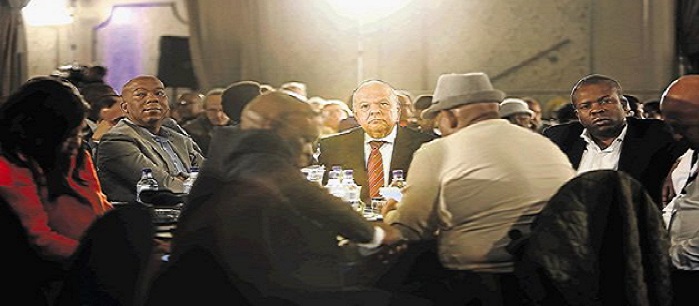South Africa is flirting with recession and the government is talking tough about its planning for the country’s economic hub, Gauteng.
At a conference in Sandton yesterday, Finance Minister Pravin Gordhan and Deputy President Cyril Ramaphosa threw their weight behind a plan to boost Gauteng and with it the rest of the nation.
Their commitment to the plan was made as Statistics SA released the latest growth figures confirming that South Africa’s economic prospects are spiralling downwards.
The decision by Fitch Ratings to hold the country’s sovereign credit rating at the lowest investment-grade level, fractionally above junk status, and to maintain its outlook at “stable”, should spur South Africans into working harder to improve the economic outlook, Ramaphosa said.
He said the government, and all business sectors, must agree on a plan to rescue one of Africa’s biggest economies and keep its rating.
“This is a great platform for people who are serious about the economy of their country. This gathering is a start to economic revival.
“The latest economic stats tell us to move with speed to grow our economy. We need a common vision – we should work together,” said Ramaphosa.
Stats SA yesterday painted a gloomy economic picture. It said the country’s real gross domestic product contracted by 1.2% in the first quarter of the year.
An 18.1% fall in the contribution to GDP of the mining and quarrying sector led the contraction.
Transport, storage and communications shrivelled by 27%. Other economic sectors that dragged down GDP were agriculture, forestry and fishing, and electricity, gas and water.
Fitch Ratings said yesterday that it was worried by South Africa’s poor GDP growth.
Gordhan said the time for plans and promises was over and that citizens wanted action.
Gauteng carries the future of the country on its shoulders, he said.
The economy talks, which continue today, have been organised by the Gauteng government.
Gordhan said the global economic environment was “pretty dismal”. “Generally there is too much volatility . and the marked negativity towards emerging markets doesn’t help [this country].”
He said South Africa’s own forecasts for the coming months do not look good but the situation was expected to improve towards the end of this year and in 2017.
“Next year is key for South Africans to show that we can move into a different kind of growth path,” said Gordhan.
He said that South Africa still had the best investment infrastructure on the continent – the question was how to use it to best advantage.
Gordhan stressed that the economy must grow so that the people benefit from investment.
“We can’t have more and more millionaires and fewer [ordinary] people benefiting,” he said.
Gordhan called for greater collaboration between business, labour and the government.
“I’m hoping that, under the leadership you have in Gauteng, you’ll be able to turn this into practical work. We will constantly have differences but this is not the time to exacerbate the differences. This is the time to collaborate.”
Gauteng’s economic development MEC, Lebohang Maile, said the global economy was not doing well and this had prompted the provincial government to look at ways of intervening to solve the problems facing the country.
“We are in danger and that is why we want to look at infrastructure development, skills development and export promotion, among other ways, to propel the economy. We also want to look at how to integrate township economies into the mainstream economy,” said Maile.
Business leaders complained about the profusion of red tape and the government’s slowness to act to stimulate the economy.
But Gauteng Premier David Makhura cautioned: “Let’s avoid a rush to nowhere. Proper planning is key to avoid choosing a route that fails to create the necessary jobs.”
Makhura said that the government and business should declare a national emergency with regard to youth unemployment.
Jabu Mabuza, chairman of Business Unity SA, and other business leaders said they shared the government’s sentiments and called for more talks to create trust.
AU Commission chair Nkosa-zana Dlamini-Zuma said Africa needed a ”skills revolution” to modernise and grow. “We need to start with our most precious resource which is our people. We must do no less than a skills revolution on this continent … These skills must be proportionally right with a big emphasis on science, technology engineering and mathematics.”
Economist Dawie Roodt said that even with President Jacob Zuma and Gordhan showing a united front by posing for photographs together, the government was not doing enough to turn the economy around. “We are in a recession and we have been in one for a year. The government has been destructive and is undermining this economy.”
The GDP figures, he said, showed that the two industries most suited to employing unskilled workers – agriculture and mining – were contracting. The government had made it difficult for farmers to operate, and labour disputes were hobbling mining.
[Source: Times Live]





 WhatsApp us
WhatsApp us 

